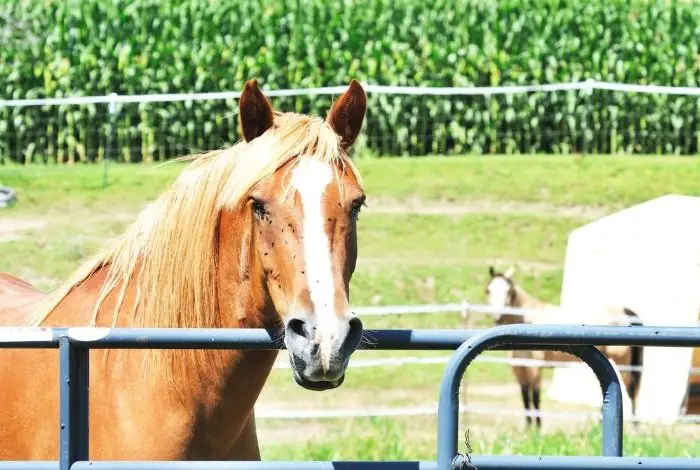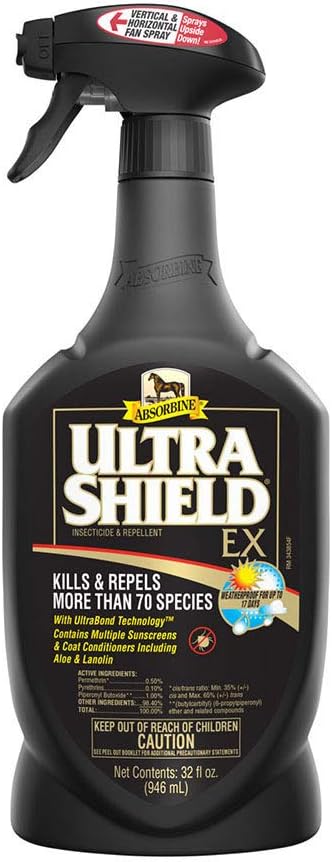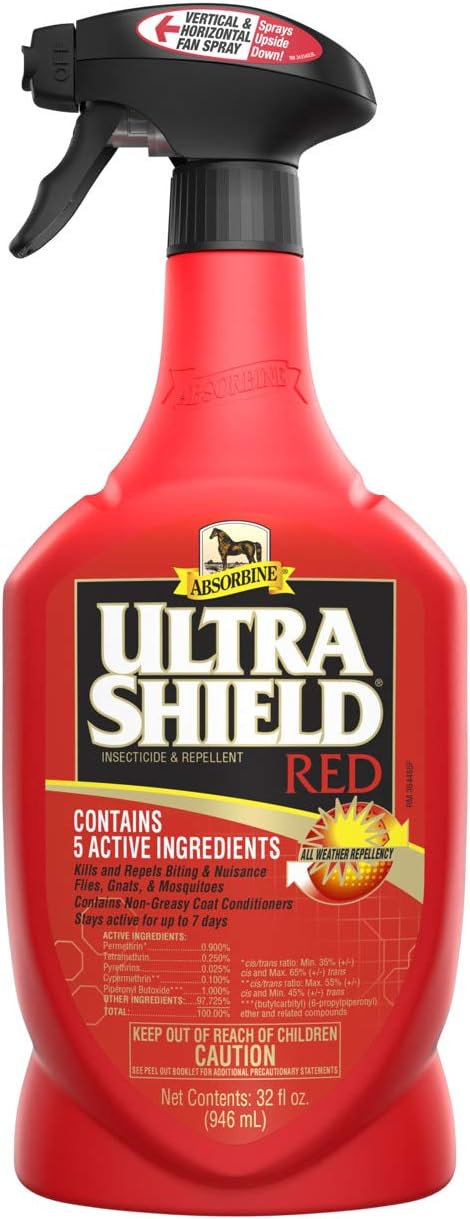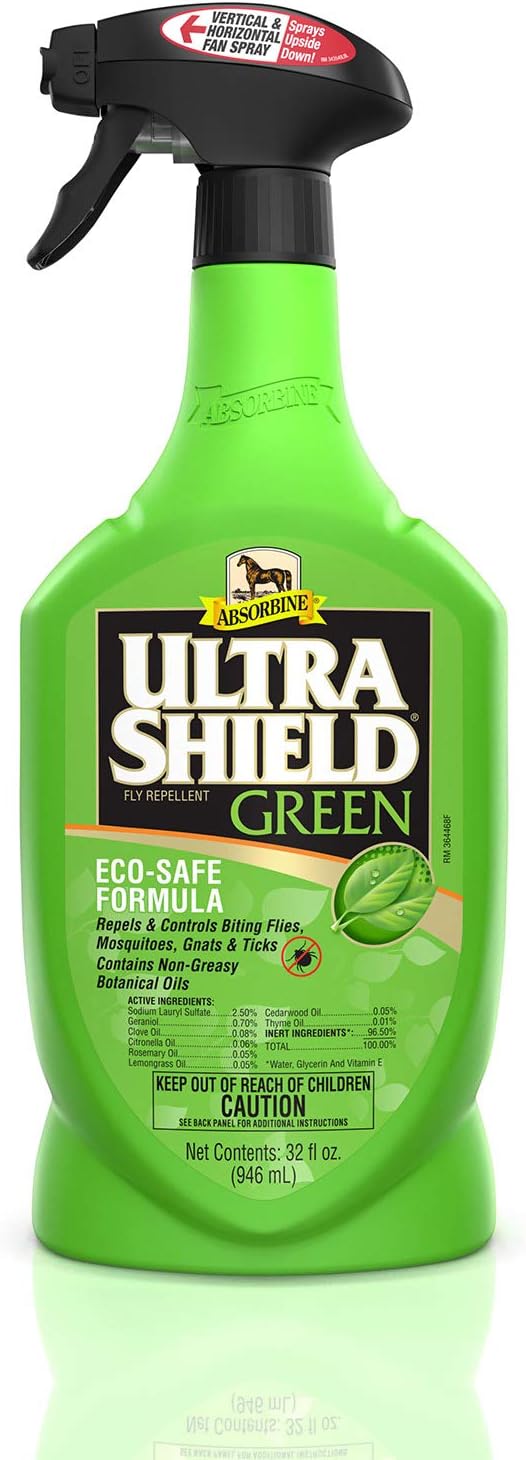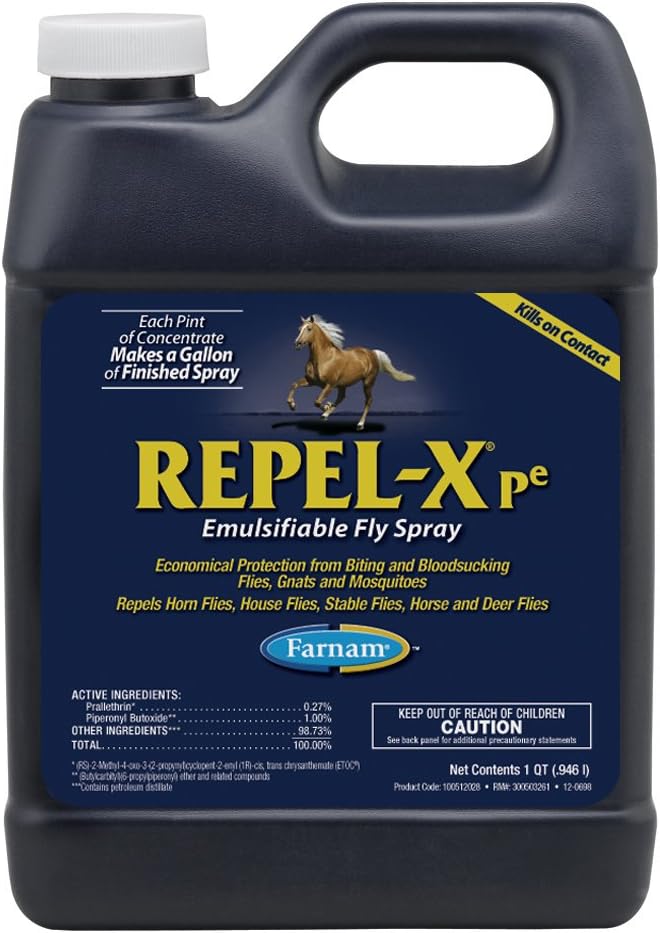Last Updated on January 22, 2022
Whether a seasoned horse owner or new to livestock, the fight against flies and other biting insects can feel like an uphill battle. With companies constantly rolling out new fly control products, it might be hard to decide what to choose as the best fly spray for horses. Fortunately, knowledge of different formula options, application methods, and active ingredients will give you a great selection to choose from.
Fly spray serves many purposes with livestock and horses. Not only does it provide your horse relief from irritating bugs, keeping biting insects off horses can help prevent dangerous disease transmissions such as Lyme disease, West Nile Virus, and even EIA. Some horses may even have allergic reactions to biting flies, so keeping unwanted bugs off is vital to their overall health and comfort.
Fly Spray for Horses Options
Application
These are the three primary methods of application:
- Direct spray (bottle or aerosol)
- Roll-on (liquid or gel)
- Wipe-On (glove, mitt, or cloth)
Some horses are used to fly sprays and stand well for spray formulas. This is convenient and a great way to hit all parts of their body. However, sometimes spray formulas are not effective for larger herds that do not receive regular spraying.
Some horses that are not yet standing for spray may also benefit from wipe-on formulas. Wipe-on formulas (with a glove, cloth, or sponge) are typically stronger concentrates, and strategically applied to specific areas of the body for optimal insect repellent.
The formulas are frequently made with an oil-base to last longer. Roll-ons, unless an oil-based concentrate for the body, are often used on the face and ears to carefully avoid sensitive spots around the eyes and nostrils while still providing protective coverage.
Many sprays are available in both a concentrate and pre-mixed ready-to-use formula. If utilizing large quantities of spray fly, sometimes it’s more economical and easier to purchase a concentrate and mix the formula in your own spray bottle. Some owners opt for this just to utilize smooth continuous-spray bottles they purchase separately for thorough application.
Read more about The Best fly boots for horses
Ingredients
Fly sprays utilize both natural and synthetic ingredients. The most common active ingredients used are pyrethrins and permethrin, although you will also find the use of resmethrin, cypermethrin, and tetramethrin. Fly spray ingredients and labels are regulated, so it is important to read the manufacturer label for vital information. Equally important, the labels will reflect the percentage of the active ingredient the spray contains. This is important when determining product potency or you have a horse with skin sensitivities.
Pyrethrins are naturally derived and the most popular solo active ingredient. Although pyrethrins kill insects quickly, they can easily be broken down by sunlight. To combat this, many formulas contain synergists to extend the effectiveness of the product. Synergists, such as piperonyl butoxide, are chemicals containing actives to increase protection time and enhance effectivity. Pyrethroids are simply the synthetic version of pyrethrins, including permethrin, tetramethrin, and resmethrin. An advantage of the synthetic pyrethrin is the longevity without adding synergists.
Some sprays only utilize essential oil blends and take a “green” approach to fly control. All-natural sprays are non-toxic and insecticide-free, containing ingredients such as citronella, eucalyptus, cedar oil, or lemongrass. These sprays simply repel insects and do not kill them, and must be applied more frequently. Due to the variation among active ingredients and their percentages, it is important to read all the manufacturer specifications for use and warnings.
Formula Base
Sprays are available in water-based or oil-based formulas. For horses with sensitive skin, oil-based formulas can be irritating. The oil-based formulas are great for coat adhesion and rapidly kill insects when they land on the product. However, the oil-based products are a magnet to dust and dirt! If a bottle does not directly state which base the fly spray utilizes, the ingredient lists will show “petroleum distillate”, indicating it is oil-based.
Because some horses may have skin reactions to oil-based formulas, veterinarians and manufacturers recommend owners apply new fly sprays to a “trial” area. This will allow you to monitor any possible adverse reaction before coating the entire horse. Although the inactive ingredients are frequently overlooked, it is important to review the full ingredient list prior to the application.
Top 7 Picks: Best Fly Spray for Horses
With endless options on the market, it may be hard to narrow down the selection to choose from. Most sprays are available in multiple sizes, allowing owners to try a smaller size prior to committing to a bulk concentrate or multi-bottle pack. The following are our top 7 picks depending on your needs:
1. Pyranha Wipe n’ Spray
Pyranha makes several top products for insect and flies spray. The Pyranha Wipe n’ Spray formula comes in the signature yellow bottle and can be purchased as a single, double, or triple bottle set. It is also available in a larger concentrate formula.
Wipe n’ Spray is an oil-based formula containing .1% pyrethrins, piperonyl butoxide to boost wear time, and butoxy polypropylene glycol. You can apply the formula with a cloth or spray as a fine mist, and it contains lanolin for coat conditioning.
| Pros | Cons |
|---|---|
| – Easy to use | – Many horses, especially those with sensitive skin, can have reactions to the oil-based formula. |
| – The citronella scent is an added repellent feature | – It can leave oily streaks when applied with a mitt and is a magnet for dust and dirt. |
2. Absorbine UltraShield Ex
UltraShield EX is the strongest formula from the Absorbine lineup. It contains both pyrethrins and permethrin (.5%), and piperonyl butoxide. The EX formula is referred to as “weatherproof” and offers up to 17-days’ protection with the Absorbine UltrBond Technology.
It is safe for use on horses and dogs and contains sunscreens. This is helpful to prevent coat fading and protection for lightly pigmented horses. Absorbine recommends this formula for horses that cannot be sprayed daily or are subject to inclement weather such as rain. Despite the effective UltraBond technology, it is a water-based formula that will not easily dirty a horse’s coat.
| Pros | Cons |
|---|---|
| – Weatherproof | – The bottles are notoriously noisy for horses that may be sensitive to being sprayed. |
| – Contains sunscreen | – It lacks the longevity of oil-based formulas. |
| – Water-based formula | – The most expensive of the UltraSheild collection |
| – Its highly effective formula contains both pyrethrins and permethrin. | – May irritate some horses |
3. Absorbine UltraShield Red
UltraShield Red is next up in the UltraShield lineup, featuring five active ingredients that last up to one week after application. This formula, like other UltraShield sprays, is water-based and approved for use on dogs or as a premise spray.
The formula offers horses protection from flies, mosquitoes, gnats, and ticks in addition to its coat conditioners. The Red formula comes in (you guessed it) their signature red bottle!
| Pros | Cons |
|---|---|
| – It offers coat conditioner | – It only lasts for up to 7 days |
| – Water-based formula | – Will not hold up against the rain |
| – Last up to one week after application | – It also has a pungent odor |
| – Less expensive |
4. Pyranha Zero-Bite- Fly Repellent for horses
Horse owners and pet owners alike rave over this natural alternative to regular fly sprays. Zero-Bite (in the green bottle) repels flies, ticks, mosquitoes, fleas, and lice.
The formula is also safe for use on dogs and pets. Oils such as clove, geraniol, and peppermint are in a water-based formula that is non-toxic and safe to use. Zero-Bite has a pleasant and lightweight scent that bugs are sure to veer away from.
| Pros | Cons |
|---|---|
| – Natural ingredients | – Due to the natural ingredient list (and lack of synergists), Zero-Bite has more frequent application than Pyranha fly spray products |
| – Water-based formula | – It only acts as a repellent and will not kill insects after exposure. |
| – It has a pleasant and lightweight scent |
5. Farnam Tri-Tec 14 horse fly spray
Farnam has a diverse lineup of fly sprays. The Tri-Tec 14 is available as a continuous spray, regular spray, and pourable bulk refill bottle. It is a water-based formula with 4 active ingredients, and Farnam states it can last for up to fourteen days.
Farnam manufactures several effective products, but Tri-Tec 14 remains a top seller due to its consistent effective formula. Tri-Tec 14 also contains sun protection.
| Pros | Cons |
|---|---|
| – Effective formula | – This no-frills formula has an unpleasant (lasting) scent. |
| – Water-based formula | – Any built-up protection will be washed away in rain or heavy sweat. |
| – It contains sun protection |
6. Absorbine UltraShield Green- Horse Fly Repellent
If it has gone unnoticed, the entire UltraShield line delivers powerful and effective fly sprays to meet all needs. The UltraShield Green is Absorbine’s eco-safe formula, with a multitude of all-natural active ingredients. Even with botanical oils, the water-based formula is non-greasy and safe for use on both horses and dogs. The formula smells great to us but helps control and repel biting insects. The Green formula has .7% geraniol, backed by 6 other powerful essential oils.
Although marked as safe for use on multiple pets, it contains 7 different essential oils. Many animals have sensitivities to essential oils, particularly cedar oil.
| Pros | Cons |
|---|---|
| – All-natural active ingredients | – Like other “green” formulas, this is not a long-lasting product and will not kill insects. |
| – Water-based formula | – Reapplication is required after working horses or exposure to water. |
| – It has a pleasant scent | – Some animals can be sensitive to essential oils. |
7. Farnam Repel-X pe
Farnam’s Repel-X pe is a fly spray staple in many barns, especially training stables with multiple horses. A single pint of concentrate will make a gallon of finished fly spray! Repel X is an economical choice containing prallethrin and piper butoxide, available in several sizes.
Farnam recommends reapplying every 3-4 days and mixing as a 1 to 7 dilution ratio. Repel X can also target specific problematic insects such as Deer Ticks by utilizing a stronger product dilution ratio.
Although economical, Repel-X pe only contains two active ingredients- less than .3% prallethrin boosted by a 1% synergist.
| Pros | Cons |
|---|---|
| – Economical option | – Only contains two active ingredients |
| – Available in various sizes | – The oil-based formula does leave a greasy band when applied heavily. |
| – Can target specific problematic insects such as Deer Ticks | – Can irritate sensitive horses. |
Final Words
Fly control will not only provide your horses with comfort, but it will also assist in the prevention of blood-borne diseases carried by biting insects. With so many options on the market, horse owners can now easily find their ideal fly spray to assist in their insect control program.
Learning to decode the labels by understanding active ingredients and their potency will help narrow down the best fly spray for your horse. We recommend consulting your veterinarian if your horse has known skin conditions or problems that may interfere with fly spray application. This also applies to pregnant or nursing mares and foals.
What is your go-to fly spray and application method? Be sure to share this article with your horse friends!
FAQs
Will peppermint oil keep horse flies away?
Evidently, yes! Peppermint oil is not only very effective in repelling horse flies but it's also good for other insects like cockroaches, fleas, bedbugs, and mosquitos. How does it work? The oils are released when we apply them to the skin, making them more effective. For example, the minty smell of peppermint oil is known to repel flies and mosquitoes. It is also a natural insecticide, which is why it can be used as a fly repellent.
Peppermint oil can be purchased online or in health food stores. You can even make your own blend with essential oils and carrier oils.
What scent attracts horse flies?
The horse fly's antennae are very sensitive and can detect smells as small as one-tenth of a part per billion. Horse flies are attracted to the odor of sweat, which is made up of many different chemicals. They are attracted to carbon dioxide and ethyl acetate, which are common in the air around us. They are also attracted to the pheromone of humans and animals, which comes from the testosterone in the sweat.
What time of day do horse flies come out?
Horseflies may be most active in the early morning and late afternoon. You may need to take precautions for you and your horse to avoid being bitten by horseflies. A horsefly is a member of the insect family Tabanidae. They look like small black and red wasps with long slender bodies. There are two species of horsefly that can affect humans: the common horsefly (tabanus bromius) and the so-called European horsefly (tabanus terrestris). The common horsefly is the most common species found in the United States. It's known for its large size and long, slender body. It has a black-and-red pattern on its wings. The common horsefly is often mistaken for the brown dog fly (a member of the order Diptera, or flies). The European horsefly looks similar to the common horsefly. Its legs are a bit shorter and its wings are smaller.
How do I keep flies off my horses eyes?
Obviously, one of the best ways to prevent flies from landing on your horse's eyes is to stop them from being able to land in the first place. Flies can't land if there is something over their heads. Therefore, anything that prevents flies from landing will work. A fly mask (also known as a fly headnet) stops the flies from landing on your horse's head and eyes.
Fly masks come in many different shapes and sizes. Some are made out of mesh and are very light weight. Others have ear covers to prevent flies landing on the ears and are quite heavy.
Does vinegar repel horse flies?
Always use gloves when working with vinegar. It can irritate the skin. And do not apply vinegar directly to the animals' skin. It can sting or burn. The vinegar will not keep the flies away. But it will keep them from landing on you and your horse. If you have a horse that is suffering from horsefly bites, you may be able to use vinegar as an area repellent. Place a cup of vinegar around the horse's stable. It can be used to prevent flies from landing on you and your horse. You may also mix the vinegar with fly bait for better results. Fly bait has proven effective at keeping horses fly-free.
Equestrian, Marine Corps vet, and Morgan horse enthusiast.
